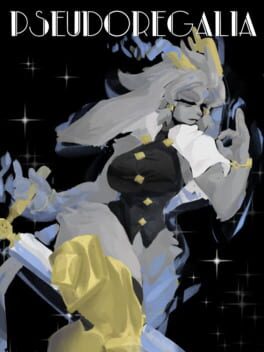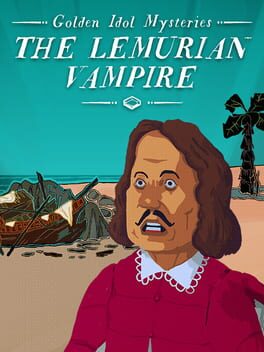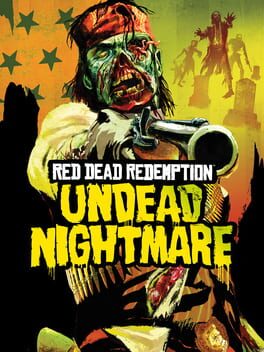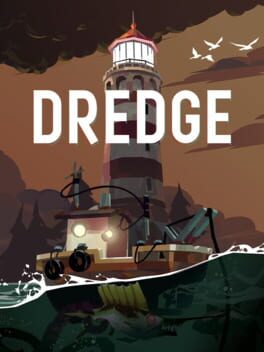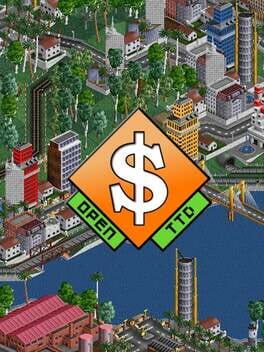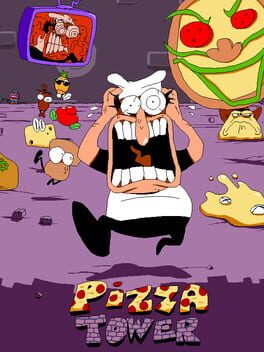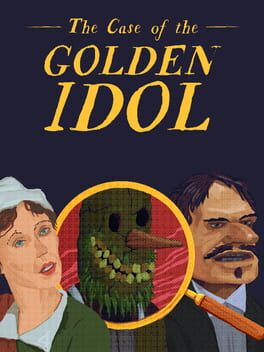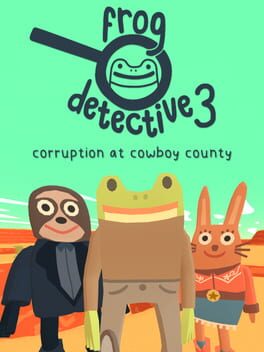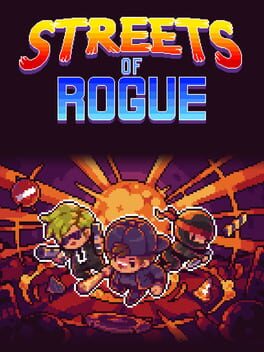Spectre_ship
2023
really, really impressive for such a small group to put this together. playing this game, just moving around in it, feels incredible. it's small enough to be a nice, tight experience but big enough to still get lost in. great in its own right and I'm really looking forward to whatever they cook up next.
2023
What would you do if you were told you were only living for someone else's sake? What would happen if you chose to live for yourself instead?
Genuinely really fantastic work--it's very much building directly on From Software's work, but it does it so well. It's like a greatest hits mixtape from their biggest fan: the fast-paced blow trading of Sekiro, the build diversity of Dark Souls games, the wide array of unique weapons from Bloodborne, all wrapped up with a thousand tiny QoL improvements like your souls spawning outside the boss door and little markers to let you know you can advance NPC questlines. When it hits it hits and it rarely misses--there's a crummy boss or bad level here and there but the game more than makes up for them with some really fantastic fights and sequences (ESPECIALLY the true final boss.)
The concept and story can be pretty silly--I realized at one point that I was wholeheartedly saying "Pinocchio, why didn't you use your Estus? I hit the button!" at my TV and started laughing--but I do genuinely really like the story, the story of a city that builds slaves that can think and feel and then drops them into the trash, the story of someone who realizes he's not a tool, or a copy of someone else, but his own real person, who we watch as he self-actualizes. The "lie" system is sort of oddly realized at times but it's also used in some really clever ways--there's one conversation with Geppetto near the end of the game that particularly floored me, where it conveys something to you about Pinocchio's thoughts regardless of what you pick. The game's explanation for the respawning mechanic is another unexpectedly clever touch, and (unless I missed something) the game holds on to actually fully explaining it until the very end, making for a really cool reveal when it comes.
Also it is presented so well--the city looks absolutely fantastic, and the changing daytime mechanic is also a fantastic touch that breathes a lot of life into the story and setting; I like that we get a sense that the game takes place over the course of several days. None of the boss themes really stood out to me, but I loved the phonograph music, and the environmental music was also pulled off really well--several areas have a little off-tune ambient song playing from an unseen loudspeaker or record player, and then a couple of areas just have standard ambient songs, all of which is nevertheless used sparingly enough to keep it memorable.
Highly recommended, and I'm very much looking forward to the sequel--as an aside, the Metal Gear Solid style post-credits phone call sequence where they tease the sequel is so funny, I cannot wait. The Neowiz "late Victorian children's fiction" gaming universe will be the next big thing, I can feel it.
Genuinely really fantastic work--it's very much building directly on From Software's work, but it does it so well. It's like a greatest hits mixtape from their biggest fan: the fast-paced blow trading of Sekiro, the build diversity of Dark Souls games, the wide array of unique weapons from Bloodborne, all wrapped up with a thousand tiny QoL improvements like your souls spawning outside the boss door and little markers to let you know you can advance NPC questlines. When it hits it hits and it rarely misses--there's a crummy boss or bad level here and there but the game more than makes up for them with some really fantastic fights and sequences (ESPECIALLY the true final boss.)
The concept and story can be pretty silly--I realized at one point that I was wholeheartedly saying "Pinocchio, why didn't you use your Estus? I hit the button!" at my TV and started laughing--but I do genuinely really like the story, the story of a city that builds slaves that can think and feel and then drops them into the trash, the story of someone who realizes he's not a tool, or a copy of someone else, but his own real person, who we watch as he self-actualizes. The "lie" system is sort of oddly realized at times but it's also used in some really clever ways--there's one conversation with Geppetto near the end of the game that particularly floored me, where it conveys something to you about Pinocchio's thoughts regardless of what you pick. The game's explanation for the respawning mechanic is another unexpectedly clever touch, and (unless I missed something) the game holds on to actually fully explaining it until the very end, making for a really cool reveal when it comes.
Also it is presented so well--the city looks absolutely fantastic, and the changing daytime mechanic is also a fantastic touch that breathes a lot of life into the story and setting; I like that we get a sense that the game takes place over the course of several days. None of the boss themes really stood out to me, but I loved the phonograph music, and the environmental music was also pulled off really well--several areas have a little off-tune ambient song playing from an unseen loudspeaker or record player, and then a couple of areas just have standard ambient songs, all of which is nevertheless used sparingly enough to keep it memorable.
Highly recommended, and I'm very much looking forward to the sequel--as an aside, the Metal Gear Solid style post-credits phone call sequence where they tease the sequel is so funny, I cannot wait. The Neowiz "late Victorian children's fiction" gaming universe will be the next big thing, I can feel it.
2017
It's fine. The actual gameplay is a mediocre change to a game that already has just, like, OK shooting; almost every enemy just rushes you down but dies to one head shot, so most of the shooting is just backing away while cycling through different guns so you don't run out of ammo. It's playable but the DLC is long enough that it starts to wear out its welcome.
However, it gets a lot of charm points by simple virtue of building off the main game, with missions that riff on main-game missions and giving the end of the world a certain texture by having it be an open world you already know from the main game. It's honestly pretty funny; the writers evidently identified that West Dickens is the only one of the New Austin goobers from the main game that's actually funny, and accordingly gave him a ton of well-deserved screen time. The soundtrack is also excellent.
However, it gets a lot of charm points by simple virtue of building off the main game, with missions that riff on main-game missions and giving the end of the world a certain texture by having it be an open world you already know from the main game. It's honestly pretty funny; the writers evidently identified that West Dickens is the only one of the New Austin goobers from the main game that's actually funny, and accordingly gave him a ton of well-deserved screen time. The soundtrack is also excellent.
2023
I like what the game is angling for, but it feels like it's missing something. I think the devs were a little too afraid of scaring people off to let the horror come out and play properly--the game is slightly too on the level about its own mechanics to be particularly scary beyond, say, the second archipelago or so. The plot is conceptually interesting, but the writing is pretty workmanlike video game text, so the story never really sunk its hooks in me unfortunately.
That being said! the gameplay loop is pretty fun, which is what sells it for me. The hodgepodge of survival-crafting progression, a classic fishing minigame fleshed out into the central mechanic, and Resident Evil inventory management puzzle was surprisingly addictive. Admittedly I think the balance is slightly undertuned? Unless I missed something there's not really any use for the final tier of upgrades and the actual gameplay is quite easy to optimize to a point that you're never cash starved, but I had fun with it regardless.
The other main appeal to me was just the joy of discovery in finding new fish and new messed up fish variants, which honestly never got old. It scratched a certain Pokémon itch of sorts for me, of just wanting to be introduced to more and more weird little dudes to catch, and to find out what sorts of weird monster evolutions they have. I honestly think i will go back and try to at least complete the standard fish journal because it's genuinely quite fun.
An aside--it has the strange feeling of being a game made by people whose main interests and inspirations are other video games. The writing feels like an attempt to write in a video-game style, in the specific manner of what it chooses to ignore (how is a fisherman dredging up a single loose belt buckle from the bottom of the sea for a greiving father?) versus what it chooses to focus on (getting magic powers to fill out your action wheel is described prosaically several times.) Every mechanic in it feels like it's based on something from a different game--the fishing is every fishing minigame you've ever played rolled up into one, the inventory management is Resident Evil and Tetris, the game world is constructed exactly the way the solar system in Outer Wilds is constructed down to a very obvious Dark Bramble ripoff. None of this is to say that I think the devs are unoriginal--in fact I think the mixture of many of these elements is quite novel--but I think the "thing that's missing" is a certain dynamism that I think having a wider range of influences would have brought.
Overall though a pretty cool game--if it sounds interesting to you it probably will be.
That being said! the gameplay loop is pretty fun, which is what sells it for me. The hodgepodge of survival-crafting progression, a classic fishing minigame fleshed out into the central mechanic, and Resident Evil inventory management puzzle was surprisingly addictive. Admittedly I think the balance is slightly undertuned? Unless I missed something there's not really any use for the final tier of upgrades and the actual gameplay is quite easy to optimize to a point that you're never cash starved, but I had fun with it regardless.
The other main appeal to me was just the joy of discovery in finding new fish and new messed up fish variants, which honestly never got old. It scratched a certain Pokémon itch of sorts for me, of just wanting to be introduced to more and more weird little dudes to catch, and to find out what sorts of weird monster evolutions they have. I honestly think i will go back and try to at least complete the standard fish journal because it's genuinely quite fun.
An aside--it has the strange feeling of being a game made by people whose main interests and inspirations are other video games. The writing feels like an attempt to write in a video-game style, in the specific manner of what it chooses to ignore (how is a fisherman dredging up a single loose belt buckle from the bottom of the sea for a greiving father?) versus what it chooses to focus on (getting magic powers to fill out your action wheel is described prosaically several times.) Every mechanic in it feels like it's based on something from a different game--the fishing is every fishing minigame you've ever played rolled up into one, the inventory management is Resident Evil and Tetris, the game world is constructed exactly the way the solar system in Outer Wilds is constructed down to a very obvious Dark Bramble ripoff. None of this is to say that I think the devs are unoriginal--in fact I think the mixture of many of these elements is quite novel--but I think the "thing that's missing" is a certain dynamism that I think having a wider range of influences would have brought.
Overall though a pretty cool game--if it sounds interesting to you it probably will be.
Pretty good. The new dungeons are fun, the building is janky but enjoyable, the new areas are cool. The greater enemy variety, the honest to god bosses, and the overall pretty well designed world map revamp make this game. It's basically a jankier weirder BotW.
I'm not super hot on the new powers--there was an elegance to Breath of the Wild that I appreciated a lot. Sequence breaks and shrine skips in that game feel cool and earned because you're working within boundaries definite enough that breaking them is an accomplishment, often requiring obscure knowledge like the shield surf double jump or the use of special weapons in combination with slate powers. Tears of the Kingdom sometimes had a really good puzzle, but I was able to cheat at a lot of them very easily--many minecart puzzles are weak to the minecart shield, many gap-crossing puzzles are weak to gluing everything in the vicinity together into a huge bridge. Overall it's fun and technically very impressive, but it loses something in its versatility. (As an aside, Ascend is such a half-baked idea for a mechanic in a game already basically centered around different ways of gaining and losing altitude. It comes in handy occasionally but 90% of spots designed to require it could have had a ladder or climbable wall available and functionally changed nothing.)
The plot is written terribly and is structured very badly. The characters are paper thin, the voice acting is generally wasted on pointless material, and if you do things remotely out of order things start falling apart--do the memories sidequest before beating the dungeons and you will tear your hair out over Link's inability to share critical plot details with everyone, ignore the game nudging you towards exploring certain areas first and you'll be locked out of game mechanics until you cave and do what they tell you.
The new enemies are genuinely very very cool. Gibdos rock and should have gotten more screentime. The final boss is my favorite fight in any Zelda game, I think, from a gameplay standpoint at least.
Also the game is broadly very pretty and I very much appreciate that exploring the map and completing segments of the game makes it prettier (removes environmental hazards, turns off big ugly map tower spotlights) whereas BotW rewarded you for completing parts of the game by permanently ruining the view with laser pointers.
It's a weird game. There are things in this that I really hate and things in it that I really like. The moment to moment gameplay is quite good, so I would recommend it overall, and I think in some ways it corrects problems I had with BotW and hits some of the 'classic Zelda' notes the last one was missing. But I also think that viewed as a whole it's a worse game than BotW that loses some of the charm by the very act of trying to recapture it.
I'm not super hot on the new powers--there was an elegance to Breath of the Wild that I appreciated a lot. Sequence breaks and shrine skips in that game feel cool and earned because you're working within boundaries definite enough that breaking them is an accomplishment, often requiring obscure knowledge like the shield surf double jump or the use of special weapons in combination with slate powers. Tears of the Kingdom sometimes had a really good puzzle, but I was able to cheat at a lot of them very easily--many minecart puzzles are weak to the minecart shield, many gap-crossing puzzles are weak to gluing everything in the vicinity together into a huge bridge. Overall it's fun and technically very impressive, but it loses something in its versatility. (As an aside, Ascend is such a half-baked idea for a mechanic in a game already basically centered around different ways of gaining and losing altitude. It comes in handy occasionally but 90% of spots designed to require it could have had a ladder or climbable wall available and functionally changed nothing.)
The plot is written terribly and is structured very badly. The characters are paper thin, the voice acting is generally wasted on pointless material, and if you do things remotely out of order things start falling apart--do the memories sidequest before beating the dungeons and you will tear your hair out over Link's inability to share critical plot details with everyone, ignore the game nudging you towards exploring certain areas first and you'll be locked out of game mechanics until you cave and do what they tell you.
The new enemies are genuinely very very cool. Gibdos rock and should have gotten more screentime. The final boss is my favorite fight in any Zelda game, I think, from a gameplay standpoint at least.
Also the game is broadly very pretty and I very much appreciate that exploring the map and completing segments of the game makes it prettier (removes environmental hazards, turns off big ugly map tower spotlights) whereas BotW rewarded you for completing parts of the game by permanently ruining the view with laser pointers.
It's a weird game. There are things in this that I really hate and things in it that I really like. The moment to moment gameplay is quite good, so I would recommend it overall, and I think in some ways it corrects problems I had with BotW and hits some of the 'classic Zelda' notes the last one was missing. But I also think that viewed as a whole it's a worse game than BotW that loses some of the charm by the very act of trying to recapture it.
2019
This review contains spoilers
I had a lot of fun with this game! Has a lot of great "aha" moments and fun puzzles. Slowly piecing the plot together is very fun and the writing is cute.
I have a lot of nitpicks, but I won't list them all off, because it makes it sound like I hate it when I liked it for the most part.
I have a lot of nitpicks, but I won't list them all off, because it makes it sound like I hate it when I liked it for the most part.
2004
2023
This is really fun. Great game about running around very fast and walloping enemies--the movement feels wonderful once you get it down, though it's a little tricky to start.
I like the soundtrack quite a lot, has a lot going on and a bunch of different styles. An important thing this game gets right is that when, at the end of levels, you have to backtrack and escape them, the music is overridden by the escape theme, and the theme is really good and you don't get sick of it or miss the original level theme that much--a lot of games botch that, I think. The artstyle is a delight as well; I wanna say it's somewhere between a handful of 90s-early 2000s cartoons and the weird Czech episodes of Tom and Jerry? Doing it's own thing also though.
It's maybe a little too maximalist for me personally? I had to play it in 1-2 hour intervals because there's just so much going on it would wear me down a little, but I enjoyed it a lot all the same.
I like the soundtrack quite a lot, has a lot going on and a bunch of different styles. An important thing this game gets right is that when, at the end of levels, you have to backtrack and escape them, the music is overridden by the escape theme, and the theme is really good and you don't get sick of it or miss the original level theme that much--a lot of games botch that, I think. The artstyle is a delight as well; I wanna say it's somewhere between a handful of 90s-early 2000s cartoons and the weird Czech episodes of Tom and Jerry? Doing it's own thing also though.
It's maybe a little too maximalist for me personally? I had to play it in 1-2 hour intervals because there's just so much going on it would wear me down a little, but I enjoyed it a lot all the same.
2022
This review contains spoilers
I went into this with pretty high hopes and I really enjoyed the front 60% or so, but I think it fell off pretty hard at the end. The game stopped being remotely unnerving once I realized that, if you don't already have the map layouts memorized, the only thing the microscopic inventory does is turn huge chunks of the game into busywork as you run pickups back and forth from saferooms to make room for key items. That being said, I liked the first two chapters or so quite a lot from a gameplay perspective, I think it just wore out its welcome. Also, I liked the puzzle design quite a bit, stuff like the pareidolia puzzle were the mechanical highlights of the game for me.
I thought the story was interesting and I like the way it's told; I appreciated the literary references and once I googled the secret ending and read some discussion I found the narrative sort of touching in its own way. However, I think that trying to do a confusing nonlinear narrative, one heavily reliant on symbolic interpretation, is a mistake if you are going to make 90% of the characters in the game anime girls with identical faces, because I had no clue who the hell anyone was until the last hour of the game.
I don't say this often about horror, but I think the game needed to spend more time explaining what the monster is actually like; maybe I'm just jaded, but I think a pulsating mass of flesh isn't actually that scary by itself, and I would have liked some sort of direction as to what it's actually doing and why it's apparently causing a time loop/reality warp/etc, when the much clearer motif connected to it is one of hive-minded conformity and the blurring of the line between self and other. I think the eye motif was a lot more evocative and the game could have stood to lean into it more. Also--I think that structurally, this didn't need to be a story about a time loop, and I think it would have been stronger without that aspect.
Beyond the character design I liked the game's visual direction a lot. It looks sort of like a Nintendo DS game in a lot of respects--the clean and minutely detailed environmental art, the extremely low-detail models displayed at sizes so small they resemble sprites--but it's clearly doing its own thing, and the environmental design is really excellent and another clear highlight of the game for me. As much as I have a deep and abiding love for the low-poly renaissance among indie games, seeing something where the chief visual inspiration is not PSX games is a breath of fresh air, and I liked that immensely.
Overall I think Signalis is an enjoyable game but a flawed one. Maybe it's just not for me! I dunno. I respect the artistry regardless.
I thought the story was interesting and I like the way it's told; I appreciated the literary references and once I googled the secret ending and read some discussion I found the narrative sort of touching in its own way. However, I think that trying to do a confusing nonlinear narrative, one heavily reliant on symbolic interpretation, is a mistake if you are going to make 90% of the characters in the game anime girls with identical faces, because I had no clue who the hell anyone was until the last hour of the game.
I don't say this often about horror, but I think the game needed to spend more time explaining what the monster is actually like; maybe I'm just jaded, but I think a pulsating mass of flesh isn't actually that scary by itself, and I would have liked some sort of direction as to what it's actually doing and why it's apparently causing a time loop/reality warp/etc, when the much clearer motif connected to it is one of hive-minded conformity and the blurring of the line between self and other. I think the eye motif was a lot more evocative and the game could have stood to lean into it more. Also--I think that structurally, this didn't need to be a story about a time loop, and I think it would have been stronger without that aspect.
Beyond the character design I liked the game's visual direction a lot. It looks sort of like a Nintendo DS game in a lot of respects--the clean and minutely detailed environmental art, the extremely low-detail models displayed at sizes so small they resemble sprites--but it's clearly doing its own thing, and the environmental design is really excellent and another clear highlight of the game for me. As much as I have a deep and abiding love for the low-poly renaissance among indie games, seeing something where the chief visual inspiration is not PSX games is a breath of fresh air, and I liked that immensely.
Overall I think Signalis is an enjoyable game but a flawed one. Maybe it's just not for me! I dunno. I respect the artistry regardless.
2022
Gonna need more time to organize my thoughts and come up with a real review, because there's so much to dig into in this game, but the long and short of it is that it's Disco Elysium (with a little Night in the Woods in there) for history nerds. It's an impeccably well-written and well-researched game that tells a moving and thoughtful story which absolutely nails the fine line of feeling topical and relevant while remaining firmly grounded in its historical setting. I cannot recommend it enough.
This is a really delightful little game; a few hours and the price of a couple movie tickets well spent, I think. I was especially impressed by its final big twist--it crept up on me for a genuinely amazing revelation.
I'm really kind of fascinated by "passive detective" games like this and Obra Dinn, where the player-detective cannot change the outcome of the story by solving the mystery. It lends itself to a fundamentally different sort of mystery to the more traditional sort, but I think I might actually like it a little more? There's this really fascinating puzzle-box quality to the style that I've never gotten out of anything else.
I'm really kind of fascinated by "passive detective" games like this and Obra Dinn, where the player-detective cannot change the outcome of the story by solving the mystery. It lends itself to a fundamentally different sort of mystery to the more traditional sort, but I think I might actually like it a little more? There's this really fascinating puzzle-box quality to the style that I've never gotten out of anything else.
2019
As far as roguelikes/lites go this one is really fun--I haven't beaten it many times but I have unlocked all the characters.
I like to compare "neo-roguelikes" to the genre's classics--what ideas can be traced from stuff like Angband to this? The inspiration I think Streets of Rogue really latches on to is the ability of the player to think laterally. Though there's a fairly small pool of different missions to complete and NPCs to interact with, the many different systems in the game--status effects, relations, alertness, combat stats--make devising solutions to problems and coming up with plans and strategies really enjoyable. Gameplay tactics like getting free healing items as a vampire--having your own blood put into bags, then topping off your HP via random back-alley NPCs--are a delight to come up with and manage, and feel like some of the classic outside-the-box tactics of classic roguelikes, like wielding cockatrice corpses as weapons to petrify opponents in NetHack.
I like to compare "neo-roguelikes" to the genre's classics--what ideas can be traced from stuff like Angband to this? The inspiration I think Streets of Rogue really latches on to is the ability of the player to think laterally. Though there's a fairly small pool of different missions to complete and NPCs to interact with, the many different systems in the game--status effects, relations, alertness, combat stats--make devising solutions to problems and coming up with plans and strategies really enjoyable. Gameplay tactics like getting free healing items as a vampire--having your own blood put into bags, then topping off your HP via random back-alley NPCs--are a delight to come up with and manage, and feel like some of the classic outside-the-box tactics of classic roguelikes, like wielding cockatrice corpses as weapons to petrify opponents in NetHack.
